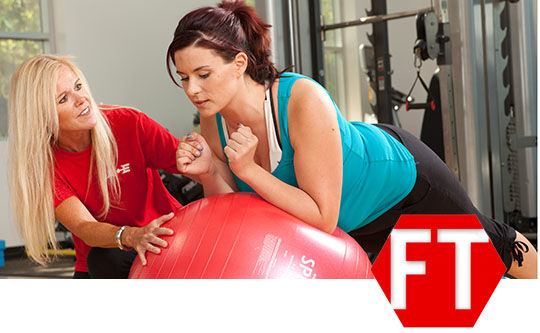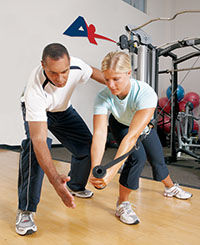
By Carrie Myers
JOIN THE CONVERSATION!
Have you considered specializing in functional training or other area of fitness? What specialty appeals to you most or offers the greatest potential for growth? Share your thoughts with us and other fitness professionals in the comments below.
You love your job, but do you sometimes get tired of focusing on six-pack abs and tight buns? Do you have days when you feel you will change careers if you have to listen to one more client complain about their weight, muffin top or butt size?
Functional training is a specialty certification now offered by ACE. As a Functional Training Specialist, you’ll be able to help people move more efficiently, prevent injury, improve their balance and flexibility, and build strength. The focus of functional training is to improve clients’ overall quality of life.
“Functional training could be the key to unlocking your clients’ results, since the focus is on quality of movement performance instead of body parts,” says Rachel Eisenman, an ACE-certified Personal Trainer in Manhattan and owner of Live Better Fitness.
“I've been the fitness director of a retirement community for the past few years,” explains Cathy Schulien Moxley, fitness director at Asbury Methodist Village in Germantown, Md. “The average age is 84 and functional training is all we do! There are zero people here looking for us to help them make their butts look better. It’s 100 percent about improving balance, strength, mobility, quality of life and staying as independent as possible.”
Functional training isn’t just for the older population, though. Athletes benefit from it as well, as it helps them move more efficiently within their chosen sport. Here, much of the focus is on core training and stability, as well as efficiency of movement for injury prevention. Many sports movements are initiated from the core, including swinging a bat, tennis racquet or golf club, so core stability and strength is vitally important.

Functional training develops all five pillars of human movement:
1. Propulsion (skating, driving, running, walking)
2. Changing levels (goalkeeping, wrestling, jumping, bending)
3. Pushing (blocking, defense, checking)
4. Pulling (wrestling, fighting for position)
5. Rotation (hitting, twisting, throwing, kicking)
Very few, if any, sports movements isolate just one muscle or muscle group. This is why functional training is vital to any athlete, as it trains two or more muscles groups at once, bringing sports-specific training to the next level.
You can help even your regular clients benefit from functional training, because it takes the focus off their weight and size. This is especially beneficial for those who are becoming discouraged with their scale weight. Ask your clients to keep a list of other benefits they’re receiving from working out. Chances are, most of them will be functional benefits, from being able to carry a load of laundry to the top of the stairs without having to stop for a break to being able to keep up with their grandchildren.
“Someone once said that everyone is an elite athlete whose sport is getting through an 18-hour day,” says Eisenman. “Functional training is ‘sports conditioning’ for that day and, of course, functional training puts the ‘FUN’ in working out!”
In the Functional Training Specialist certification, you’ll take courses on functional anatomy, postural assessments, core and flexibility training, techniques for spotting and cueing, principles for better understanding integrated movement, and multiple open- and closed-kinetic chain exercises.
Whether your goal is to help improve an athlete’s performance or help an elderly client improve his or her quality of life, becoming a Functional Training Specialist will keep you at the top of your game—and make you a sought-after specialist in this very important field.
LEARN MORE ABOUT BECOMING A FUNCTIONAL TRAINING SPECIALIST
_______________________________________________________________________________
 Carrie Myers has a bachelor’s degree in exercise science and has been a freelance writer for more than 11 years. She is the author of the award-winning book, Squeezing Your Size 14 Self into a Size 6 World: A Real Woman's Guide to Food, Fitness, and Self-Acceptance and presents, teaches and trains in N.H. and Vt.
Carrie Myers has a bachelor’s degree in exercise science and has been a freelance writer for more than 11 years. She is the author of the award-winning book, Squeezing Your Size 14 Self into a Size 6 World: A Real Woman's Guide to Food, Fitness, and Self-Acceptance and presents, teaches and trains in N.H. and Vt.